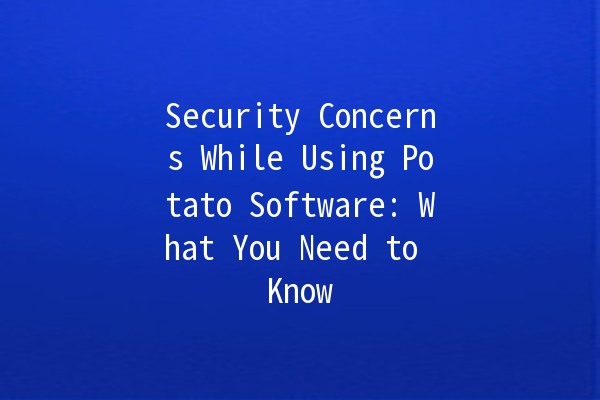As digital tools continue to evolve, so do the concerns surrounding their security. Potato Software is one such tool that has garnered attention for its features and functionality, but with that use comes a critical need to address security issues. Protecting sensitive information and ensuring user safety has never been more paramount. In this article, we delve into the security concerns surrounding Potato Software and provide actionable tips to enhance your productivity while keeping your data secure.
Understanding the Security Risks of Potato Software
Potato Software, like many digital applications, can expose users to various security threats. Understanding these risks is the first step in mitigation. Here are some of the main concerns:

Productivity Tips for Secure Usage of Potato Software
Enhancing your productivity doesn't mean sacrificing security. Here are five specific productivityboosting techniques that incorporate security best practices when using Potato Software.
Explanation: Secure your account with strong, unique passwords and enable 2FA when available.
Practical Application: Use a password manager to generate and store complex passwords. For example, if your password for Potato Software is "Passw0rd123", change it to a long combination of letters, numbers, and symbols, like "T!mp3rAnTr3vvH$42". Enable 2FA to add an extra layer of protection, prompting a verification code sent to your mobile device whenever you log in.
Explanation: Software updates often include patches for security vulnerabilities along with new features.
Practical Application: Set reminders to check for updates at least once a week. For instance, schedule a "Software Update Day" on your calendar every Friday. When a new version is available, read the update notes to understand what vulnerabilities are being addressed.
Explanation: Many applications have builtin privacy settings that can help safeguard your data.
Practical Application: Go to the settings within Potato Software and adjust your privacy options. For example, disable unnecessary data sharing features, such as location services or activity tracking, that may not be essential for your use case.
Explanation: Awareness is your first line of defense against social engineering attacks.
Practical Application: Take time to familiarize yourself with common signs of phishing, such as generic greetings in emails, misspellings, or unexpected attachments. For instance, if you receive an email claiming to be from Potato Software requesting personal information, verify the sender's address and reach out to customer support if in doubt.
Explanation: Not all users need access to all data; limiting permissions can prevent unnecessary risks.
Practical Application: If you are managing a team using Potato Software, create user roles that restrict access to sensitive information. For instance, if you have sensitive financial data stored, only give access to those who absolutely need it, such as finance department members, and set readonly permissions for others.
Frequently Asked Questions (FAQ)
Potato Software, like any other tool that processes user data, can be at risk if security protocols are neglected. The absence of encryption, outdated versions, and untrained users can all contribute to making the software susceptible to breaches.
Signs of compromise may include unusual account activity, changes in settings without your knowledge, or prompts that require entering personal information unexpectedly. Monitoring your account and audit logs regularly can help in spotting these anomalies.
To determine this, review the software documentation or contact their support team. Reputable software providers adhere to GDPR, CCPA, or other necessary regulations, often outlining their compliance measures in their privacy policies.
While many thirdparty integrations can enhance functionality, they also pose security risks. It is crucial to research the thirdparty service providers, read user reviews, and ensure that they comply with best security practices before integrating with Potato Software.
If you believe you've encountered a phishing attempt targeting Potato Software users, refrain from clicking any links or providing sensitive information. Report it to the software's customer support or through their official channels to take action against the threat.
Using Potato Software over public WiFi can expose you to various risks. To bolster your security, use a VPN (Virtual Private Network) when connecting to public networks. This will encrypt your internet connection, making it much harder for unauthorized users to intercept data transmitted over the network.
Navigating the world of software security, especially with tools like Potato Software, may seem daunting. However, by implementing these practices, you can significantly enhance your security while optimizing productivity. Keep informed of the latest security practices, stay proactive about updates, and always prioritize your data safety. With the right strategies, you can bypass the risks and fully enjoy the benefits that Potato Software has to offer.